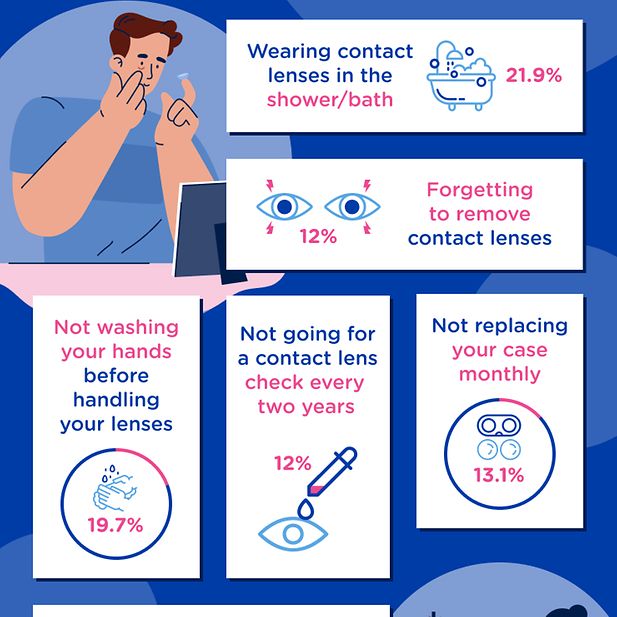Life can get hectic, which means that our eye care habits can slip to the wayside as other things take precedence. However, those seemingly harmless habits can gradually take a toll on our eye health, with the potential to cause side-effects. From sleeping in contacts to swimming in contacts, we surveyed the nation to find out what the UK’s vision vices are and who’s guilty of committing crimes against their eyes. We’ve also shared our best advice on how to care for your vision, including book regular eye tests and ensuring you always choose contact lenses and buy contact lenses online from trusted retailers, and sunglasses that protect you from UV rays.
Free delivery for orders £59 and up
Free delivery for orders £59 and up
Vision Vices – Focus on your eye health

There are so many habits that we unknowingly incorporate into our lives that can be detrimental to our eye health – ones that you don’t even know could be doing damage. But which ones are we most guilty of? Well, 37% of Brits admit that they’re not catching enough Zs. Much like the brain and body – the eyes heal themselves when you go to sleep and lack of sleep can result in having bloodshot, dry or irritable eyes.
Up next on the list of top 10 terrible eye care habits that people commit is not drinking enough water. A whopping 33% of respondents are concerned about the of low levels of water they are drinking. Dehydration can lead to a whole host of issues like headaches, light-headedness, tiredness and dry mouth and eyes. Dry eyes often happen because of a reduction in the production of tears leads to poor lubrication – which means you aren’t able to wash away foreign matter or debris from the eyes, increasing the risk of discomfort and irritation. Finally, it appears we’re a nation that is glued to our screens. Whether it’s a phone, computer, tablet or a TV screen, too much screen time comes in third place with 30% admitting to it. So, it’s also not surprising that less than a quarter (24%) of people said that they purposely take regular screen breaks.
Other notable bad habits are constant touching or rubbing eyes, not applying SPF to eyelids and nearby area and sleeping in make-up (20%, 14% and 11% respectively) So, while some of these habits seem innocuous, it’s important to recognise the negative impact on your eye health when they’re a part of your daily routine.
Rank | Bad habit | % of Brits guilty of it |
1 | Not getting enough sleep | 37.1% |
2 | Not drinking enough water | 32.8% |
3 | Too much screen time/not giving your eyes enough rest (20-20-20 rule) | 29.9% |
4 | Constant touching or rubbing of your eyes | 19.9% |
5 | Working in dim lighting | 15.5% |
6 | Having an unhealthy diet | 15.4% |
7 | Not applying SPF to eyelids and nearby area | 13.9% |
8 | Not changing pillowcases frequently | 13.2% |
9 | Not wearing UV-protective sunglasses | 11.3% |
10 | Smoking | 11.0% |
11 | Going to sleep with make-up on | 10.6% |
12 | Not regularly cleaning make-up brushes/applicators | 9.5% |
The big eye issues
Bad habits can come back to bite you which is why we asked Brits to tell us which eye issues they suffer from the most. It turns out there are plenty of dry eyes in the house as 24% of respondents state they suffer from this condition– which can be a result of reduced blinking that occurs when staring at screens for too long. In second place, 22% complain that they suffer from watery eyes, which can be allergy-related, but also an effect of dry eyes, when there aren’t enough tears for the front surface of the eyes to remain moist, meaning that fresh tears simply roll off. Other common eye issues that people experience are itchy eyes (21.7%), eye floaters (20%) and hay fever related symptoms (17%.) While not every eye issue on the list is directly related to bad eyecare habits, there are some that can be directly linked, so it’s clear that you need to be extra careful when you find yourself slipping into poor eyecare habits.

Out of habit with contact lenses
If you’ve used contact lenses for many years, it’s easy to fall into bad eye hygiene habits. That’s the same whether you wear varifocal contact lenses or prescription lenses. You think, “Oh, I’ll just do it this one time” and bam! The next thing you know is that you’ve been sleeping in your daily contacts for a week straight (which you should never do unless instructed by your eye care professional).
So, where are British contact lens wearers slipping up the most? Ironically, it seems that it’s the bathroom where our eye care hygiene habits are less than stellar as 22% of respondents admit to wearing contact lenses in the shower or the bath. While it’s tempting to nip into the shower with lenses in because you’re running late, or to better see what products you’re using, it’s a very bad idea. Contact lenses are a porous material and act as a host for infections when in contact with water, which contains potentially harmful bacteria that can greatly increase the risk of nasty eye infections and irritations. It’s in your best interests then to take them out before you shower or wash your face.
In second place is the fact that a worrying 20% of Brits don’t wash their hands before handling their lenses – a worrying and somewhat unsavoury statistic. The issue here is self-explanatory – your delicate eyes are now exposed to wherever your hands have been. Take the time to practice good hygiene habits when handling your contacts – your eyes will thank you for it!
Rank | Bad habit | % admitting to it |
1 | Wearing contact lenses in the shower/ bath | 21.90% |
2 | Not washing your hands before handling your lenses | 19.71% |
3 | Sleeping in contact lenses that aren't meant to be slept in | 16.79% |
4 | Not replacing your case monthly | 13.14% |
5 | Not going for a contact lens check every two years | 12.04% |
6 | Forgetting to remove contact lenses | 12.04% |
7 | Not adhering to a care regime, which involves cleaning, disinfecting and rinsing contact lenses | 11.68% |
8 | Reusing daily contact lenses | 11.31% |
9 | Wearing contact lenses while swimming | 11.31% |
10 | Not following the care and compliance of contact lenses as instructed by your eyecare professional | 10.95% |
11 | Storing your contact lenses in something other than the solution | 5.11%% |
Forgetfulness and ease aren’t the only reasons why people fall into bad eye care habits. Purposefully cutting corners when it comes to contact lens care is also a result of the cost-of-living crisis. In fact, nearly 30% of Brits feel that tightening the purse strings has directly impacted the way they use contact lenses. As a result, a quarter of savvy savers have opted to switch brands to get their hands on cheap contact lenses as a result.
However, to get the most bang for their buck, 40% of respondents admitted to reusing daily contact lenses to extend their lifespan. On average, 32% of people are stretching them to last two or three days but worryingly 1 out of 10 respondents are stretching them to last over a week. When you’ve got more urgent bills to pay, it’s easy to think this is a good cost-saving measure. But daily contacts are designed to be thrown away after every single use and reusing them can put your eye health at serious risk, so it’s best to find a better deal for dailies online and save money that way.
It's not only unhygienic corner-cutting hacks like using water to clean or store contact lenses, or not replacing/sterilising cases monthly (29% and 21% respectively) that people are undertaking to save cash. Nimmi Mistry, professional services optician here at Vision Direct, warns of the dangers of these cut backs: ''Mixing your contact lenses with water, such as swimming in contact lenses or rinsing your lenses in water increases the risk of contracting a parasitic infection, commonly known as 'Acanthamoeba Keratitis'. This rare but painful infection can result in sight loss if left untreated.”
People are also skipping eye check-ups too. Cost is the biggest reason cited as to why nearly a quarter (24%) of Brits miss their regular eye exam. While these measures may be an option when funds are tight, prioritising your eye health is essential in preventing long-term future complications, some of which may have detrimental effects and potentially lead to a bigger eye care bill in the future.
But it’s not all doom and gloom. It turns out there are people taking the necessary steps to look after their eyes – in ways that don’t cost money. But who is investing in their eye health the most? Well, it turns out men are more proactive when it comes to looking after their eyes, with 26% of men admitting to taking precautions to protect or improve their eyesight compared to women. Taking eye-specific vitamins (14%), wearing eye protection (23%) and quitting smoking (15%) are just some of the notable steps that men are more likely to take than women (11%, 16% and 10% comparatively).
Despite ageing being a huge factor when it comes to the degenerative nature of eyesight, Gen-Z are most committed to looking after their eye health, with nearly half (47%) taking extra steps to protect theirs. In fact, it was the 55+ age group that, at only 17%, had the lowest number of respondents who admitted to trying to protect or improve their eyes. Well, the best defence is a good offence, so it’s better to take preventative measures while you’re younger than wait for the problem to grow worse. This could be because the younger generations are more informed about these steps thanks to the nature of social media apps like TikTok. In fact, Millennials and Gen-Z are more likely to practice conscious blinking, do eye exercises and apply sunscreen to their eyelids and nearby areas to improve and protect their eye health.
An optician’s 5 top ways to protect and improve eyesight:
- Always wear sunglasses on bright days to protect your eyes from harmful UV radiation
- Ensure you have a regular sight test, usually once every two years unless suggested otherwise by eyecare professional.
- Always take regular breaks from your screens at work and home
- Ensure your diet is abundant in colourful fruits, vegetables and omega-3 fatty acids
- If you’re a contact lens wearer, always follow care and compliance instructions from your eyecare professional. Ensure that you wash your hands and adhere to a routine which promotes hygiene.
